

Early Neglect Alters Kids' Brains. Until the 1990s, the orphanages of Romania were notorious for their harsh, overcrowded conditions.
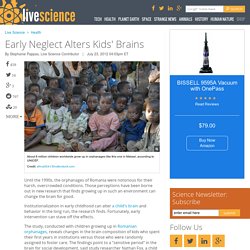
Those perceptions have been borne out in new research that finds growing up in such an environment can change the brain for good. Institutionalization in early childhood can alter a child's brain and behavior in the long run, the research finds. Fortunately, early intervention can stave off the effects. The study, conducted with children growing up in Romanian orphanages, reveals changes in the brain composition of kids who spent their first years in institutions versus those who were randomly assigned to foster care. The findings point to a "sensitive period" in the brain for social development, said study researcher Nathan Fox, a child development researcher at the University of Maryland. The finding adds to evidence that early childhood experiences can have lasting impacts on the brain, with one recent study showing that child abuse may shrink regions in the brain's hippocampus. Attachment: Romanian Orphan Studies. In Rutter’s subsequent research in 2007, he assessed children reared in profoundly depriving institutions in Romania and subsequently adopted into UK families.
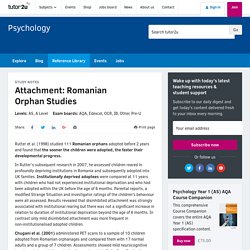
Institutionally deprived adoptees were compared at 11 years with children who had not experienced institutional deprivation and who had been adopted within the UK before the age of 6 months. Parental reports, a modified Strange Situation and investigator ratings of the children’s behaviour were all assessed. Results revealed that disinhibited attachment was strongly associated with institutional rearing but there was not a significant increase in relation to duration of institutional deprivation beyond the age of 6 months. In contrast only mild disinhibited attachment was more frequent in non-institutionalised adopted children.
Chugani et al. (2001) administered PET scans to a sample of 10 children adopted from Romanian orphanages and compared them with 17 normal adults and a group of 7 children. Romanian Orphans Investigation. AIMS: One of the consequences of psychological research into the effects of institutionalisation - see Separation, Maternal Deprivation and Evaluating Bowlby - was to greatly reduce the extent to which children were placed in such care.
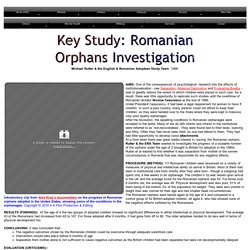
As a result, there was little opportunity to replicate such studies until the overthrow of Romanian dictator Nicolae Ceaucescu at the end of 1989. Under President Ceaucescu, it had been a legal requirement for women to have 5 children. In such a poor country, many parents could not afford to keep their children; so they were handed over to the State where they were kept in massive, very poor quality orphanages. Childhood neglect erodes the brain. In perhaps the most famous study of childhood neglect, researchers have closely tracked the progress, or lack of it, in children who lived as infants in Romania’s bleak orphanages and are now teenagers.
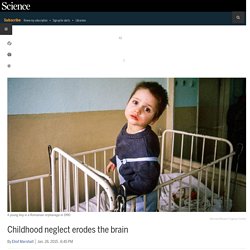
A new analysis now shows that these children, who display a variety of behavioral and cognitive problems, have less white matter in their brains than do a group of comparable children in local families. The affected brain regions include nerve bundles that support attention, general cognition, and emotion processing. The work suggests that sensory deprivation early in life can have dramatic anatomical impacts on the brain and may help explain the previously documented long-term negative effects on behavior. But there’s some potential good news: A small group of children who were taken out of orphanages and moved into foster homes at age 2 appeared to bounce back, at least in brain structure.
The orphanages have sharply reduced their intake today. Bick agrees on that point. Psychology & self improvement. Internal objects - melanie klein trust. Mindmapping the Mac Way. Person-Centred Counselling Training - Dave Mearns. Rogers' Humanistic Theory of Personality. Person-Centred Therapy. Person-centred therapy - also known as person-centred counselling or client-centred counselling - is a humanistic approach that deals with the ways in which individuals perceive themselves consciously rather than how a counsellor can interpret their unconscious thoughts or ideas.

Created in the 1950s by American psychologist, Carl Rogers, the person-centred approach ultimately sees human beings as having an innate tendency to develop towards their full potential. However, this ability can become blocked or distorted by our life experiences - particularly those that affect our sense of value. The counsellor or psychotherapist in this approach works to understand an individual's experience from their point of view.
The counsellor must positively value the client as a person in all aspects of their humanity, while aiming to be open and genuine. The purpose of person-centred therapy According to Rogers, there are six conditions necessary to enable real change. I am. Whole more than sum of parts. Gestalt Therapy. Gestalt therapy refers to a form of psychotherapy that derives from the gestalt school of thought.

It was developed in the late 1940s by Fritz Perls and is guided by the relational theory principle that every individual is a whole (mind, body and soul), and that they are best understood in relation to their current situation as he or she experiences it. The approach combines this relational theory with present state - focusing strongly on self-awareness and the 'here and now' (what is happening from one moment to the next). In gestalt therapy, self-awareness is key to personal growth and developing full potential. Humanistic Theory. Humanism. Summary: Humanism is a paradigm/philosophy/pedagogical approach that believes learning is viewed as a personal act to fulfil one’s potential.

Key proponents: Abraham Maslow, Carl Rogers, Malcolm Knowles Key terms: self-actualization, teacher as facilitator, affect Humanism. Abraham Maslow and the Theory of Humanistic Learning. Maslow, Abraham H. (1908-1970) Humanistic Theory of Learning 1908 – 1970, Born in Brooklyn NY Ph.D., Univ. of Wisconsin, 1934 Theory Abraham Maslow has been considered the Father of Humanistic Psychology.
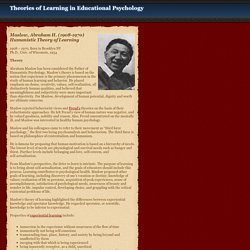
Maslow's theory is based on the notion that experience is the primary phenomenon in the study of human learning and behavior. Psychologues et psychanalystes. Melanie Klein 1882-1960. Melanie Klein. Psychology. Object relations and narcissism, borderline. Melanie Klein.